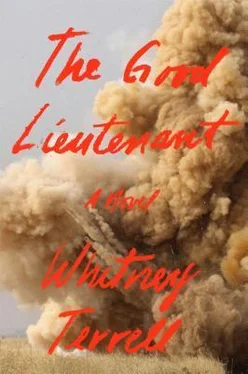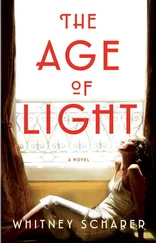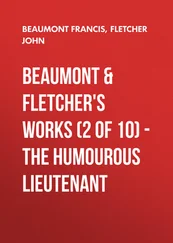“Shut up, Pulowski,” Fowler said pleasantly. And then, in the moment that her blades left the rubber mat and she could feel the greasy uncertainty of the ice underneath her, frictionless, like outer space, she squealed in a very un-lieutenant way and grabbed Harris’s arm. “Holy shit!”
“Okay, okay,” Harris said, concentrating. He’d reached a hand out instinctively, as if to pacify her. “We can do this.” This she remembered about Harris: his concentration. The small jut of his lower lip, bright scarlet, the way his nose wrinkled up, rabbitlike, when he was really concentrating. They tottered silently through a quarter turn of the rink like this. Even his grand unified theory of the idiocy of her trip to Iraq was itself a form of concentration. He must have thought of it ahead of time, worked it all out, imagined what he would say. And what was concentration but a form of love, no matter how it came out? It was his best attribute, the thing he had to give.
He was quiet now beside her, absorbed. You could have called it meditation, save for the occasional spasms that ran through his limbs when his balance faded away. He skated just exactly like she did: determined not to look the fool. And now, steadying herself, bending her knees as Pulowski had suggested, reaching that state of glide which, oddly enough, seemed to be largely composed of not trying to glide, she tried to work out what Pulowski had told her about her brother, the complicated riddle that she was not responsible for how her brother had turned out and yet, at the same time , was and always would be. “You trust him?” Harris said. He was still holding her hand.
The question was a surprise. It appeared to be genuine, no pose, no implied criticism. She wobbled, overcorrected, clutching Harris’s sleeve. “Who, Pulowski?”
“Yeah. I kind of like the guy. Is he gonna stick?”
“He’s okay,” she said.
“Not like Mom?”
“You mean not like me,” she said. She was blinking her eyes more than usual, as if the wind had scalded them. “I’m sorry about the car,” she said. “All of that. I mean, we never even talked about it. I don’t know why I have to be such a hard-ass.”
Harris shrugged, as if he wasn’t entirely sure he would’ve wanted things to be different. “You were never like Mom,” he said.
“Do you really think so?”
Harris raised his shoulders as if he didn’t care. “You were worse.”
“No, I wasn’t!”
“See?” Harris said cheerfully. “It’s useful to have someone be absolutely sure you fucked up. Gives you something to define yourself against.” He slid his cigarettes back in his jacket. “You ought to try it sometime.”
Instead, she glided through a forest of memories as fleeting and as finely detailed as the backs of the skaters that they trailed. She had wrestled Harris on the Indian rug in her father’s living room, and argued over her willingness to defeat him. “Try harder,” he’d insisted. “It’s no fun if you let me win.” And in the passenger seat of the Ford, a teenager with nervous hands and the experimental outline of a pack of cigarettes in his breast pocket, arguing with her over Vincent Foster, who she refused to admit had been murdered by the CIA. Everything had to be questioned; every position she took, examined, checked for flaws — or maybe just dismissed for the sake of it. A waste. But who said it had to be? She and her brother had argued enough to fill fifteen of Pulowski’s laptops, and yet it was only now that she had ever considered that maybe he hadn’t really meant to trap her in a snare. Maybe Harris’s jutted lip and wrinkled nose were attention, directed with all his soul, her way. “It seems a little academic, doesn’t it,” she asked, “which one of us has the true view of the shittiness of everything?”
Harris was silent after she spoke, watching as Pulowski, up ahead of them, fumbled for his stocking cap. “I’ll do the next-of-kin thing,” he said. “Okay? I’ll give you my address. But that’s as far as I go. And you gotta promise to do one thing for me.”
“What is it?”
“Find somebody to be your Emma over there.”
“What’s that supposed to mean?”
“Let somebody else do the work, for once,” Harris said. “Let somebody else worry about what’s supposed to be true but isn’t. That way you can figure out what you really believe. It works. Or anyway, it worked for me.” His coat buzzed, and, pulling out his phone, he held a finger up and said, “Sorry, I gotta take this.”
They had reached the open gate that led off the rink. Harris murmured into the phone and then, with a sharp and amused glance at Fowler, one that implicated her in his amusement, he let go of her and glided rather stylishly for the exit, stepping over the scarred wood plank and onto the black rubber mat and into the crowd. She watched him go. Without her, he fit in, looked as organized and citified in his moleskin coat and his yellow tie as anybody there — a part of whatever was happening here. The first club he’d ever wanted to join. Then she swung around awkwardly to find Pulowski.
Fowler was in the kitchen. Pulowski sat with her father in the low-ceilinged gloom of her ancestral TV room. A decent-size flat-screen illuminated a knitted throw rug in red and black Native American patterns, old enough that he suspected the threadbare patches nearest the TV had been put there by Fowler’s elbows. Her father, Donny Fowler, was slight, dressed in a denim shirt and with thinning black hair that he wore combed straight down in a bowl. His skin had drawn into a tight little bunch of wrinkles up under his neck, and his eyes were brown and mobile. When he’d briskly shaken Pulowski’s hand a half hour ago, Pulowski had been surprised to find a flash of timidity in his gaze — a groping quality, as if he were begging the lieutenant to accept him, his house, and his friends for what they were, despite whatever deficiencies might exist. “Lieutenant, this is our resident bullshit artist — I’m sorry, cousin, Bob Summers. My advice is don’t let him touch anything that you’re hoping to see ever again,” said Donny Fowler, introducing a man in a purple Kansas State fleece and a pair of khakis, who was examining the Pinot Noir that Pulowski had carted in. “Now, see that, Bob? That make you feel better? Bob is always dissatisfied with the wine list over here. But what the hell do I know about it anyway? That’s officer business, not mechanic territory. What I can do, what I will do, is get you another beer—”
“No, I’m fine,” Pulowski said.
“That is not fine,” Donny Fowler said. “Not fine at all.” He turned then away from Pulowski, handed an empty bottle to the kid who’d accompanied Pulowski inside, and said, “Ronnie, you go get your mother to pull out a Corona from the fridge for the lieutenant here. We’re gonna sit him right down and have him relax.”
Like his father, who, once the football-watching started in their own family, tended to quietly excuse himself and drift away to his study, Pulowski had never been particularly comfortable in the company of a large group of men. He didn’t know how to sit. Had never chewed or smoked tobacco. He could drink just fine — and he was glad he’d pregamed with some beers up by the Ryersons’ place — so once young Ronnie Summers came back to him with a Corona Light, he focused intently on that.
“So, I guess you guys have been training pretty hard to get ready for all this,” Bob Summers said. “Ol’ Donny here tells me that he’s been hearing all kinds of artillery, last couple of weekends. Isn’t that right, Don?”
“Shoo,” Donny Fowler said. “I think that might’ve been why I chose to put money on the goddamn Lions.” He spun a circle by his ear. “That stuff’s loud enough for me to get out on PTSD. Man, I’d hate to be underneath it.”
Читать дальше












